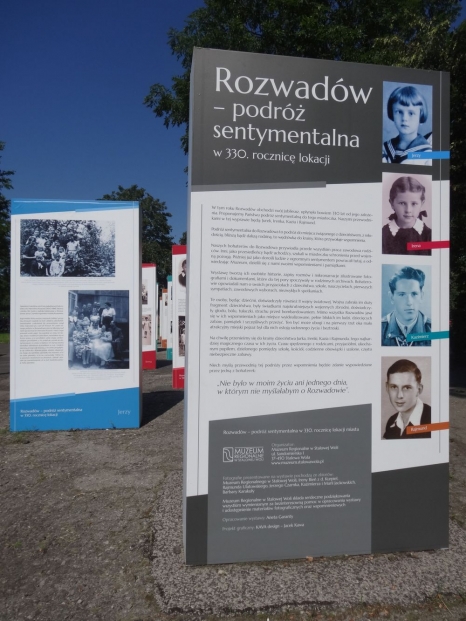
Rozwadów – podróż sentymentalna w 330. rocznicę lokacji miasta. Wystawa jubileuszowa
July 2020 – December 2020, outdoor exhibition, Market Square in Stalowa Wola-Rozwadów
The outdoor exhibition entitled. “Rozwadów – a sentimental journey on the 330th anniversary of the town’s incorporation”, consists of archival, mostly unpublished photographs. They were donated by former Rozwadów residents who spent their childhood here. They also become storytellers and guides to it. Following in the footsteps of Irenka, Rajmund, Jurek and Kazio, we become witnesses to their childhood experiences and the great history unfolding in the background. The keynote of this journey through memories are the words spoken by one of the protagonists, Irena Bień: There was not a single day in my life when I did not think of Rozwadów.
In 2020 Rozwadów celebrated its anniversary, as 330 years have passed since its founding. The exhibition prepared on this occasion is a sentimental journey to this former town. In this journey we go where human memory reaches.
The outdoor exhibition consists of two parts. The first is a story about Rozwadów as seen through the eyes of four children. Some were brought here primarily by their parents’ professional work, others, as displaced persons or refugees, sought refuge in the town from the conflagration of war. Later, as adults, they returned to Rozwadów with great sentiment, and when visiting the Museum they shared their memories and souvenirs.
Wystawę tworzą osobiste historie, zapisy rozmów i mikro narracje zilustrowane fotografiami i dokumentami, które do tej pory spoczywały w rodzinnych archiwach. Bohaterowie wystawy, dziś już dojrzali ludzie, opowiedzieli o swoich przyjaciołach z dzieciństwa, szkole, nauczycielach, pierwszych sympatiach, zawodowych wyborach, niezwykłych spotkaniach. Będąc dziećmi doświadczyli również II wojny światowej. Zabrała im ona duży fragment dzieciństwa, byli świadkami najokrutniejszych wojennych zbrodni, doświadczyli głodu, bólu, tułaczki, strachu przed bombardowaniem. Mimo wszystko Rozwadów jawi się w ich wspomnieniach jako miejsce wyidealizowane, pełne bliskich im ludzi, dziecięcych zabaw, pamiątek i szczęśliwych przeżyć. Ten być może ubogi i, zdawać by się mogło, mało atrakcyjny miejski pejzaż był dla nich ostoją radosnego życia i beztroski.